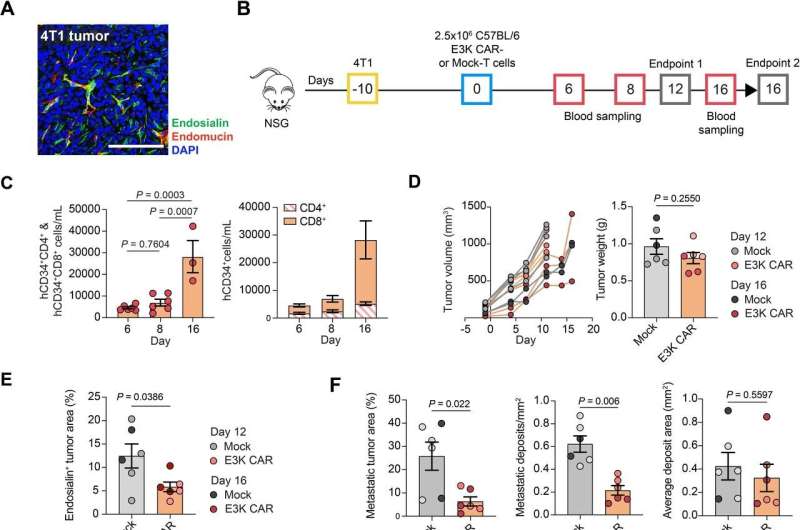This article has been reviewed according to Science X's editorial process and policies. Editors have highlighted the following attributes while ensuring the content's credibility:
fact-checked
peer-reviewed publication
trusted source
proofread
Targeted immunotherapy could lead to pioneering treatment for breast cancer

A new type of immunotherapy that targets non-cancer cells could help prevent the growth and spread of breast cancer tumors, according to new research.
The discovery, published 28 February in the Journal for ImmunoTherapy of Cancer, has found that an immunotherapy approach targeting a protein called endosialin disrupts the tumor's blood supply and, as a result, can hinder its growth and spread.
A new approach to attack cancer
Unlike most cancer treatments, this innovative treatment doesn't target cancer cells directly but attacks the cells that support the disease instead.
Immunotherapy is a type of cancer treatment that works by helping the body's own immune system to recognize and kill cancer cells.
Researchers at The Institute of Cancer Research, London, used a type of immunotherapy called CAR-T therapy, which involves removing a patient's healthy immune cells and genetically modifying them to attack specific targets.
Cutting off the blood supply to tumors
CAR-T therapies are already being used to treat some blood cancers, and scientists are trying to find ways to make them effective for other types of cancer, including breast cancer. However, CAR-T cell therapy doesn't always work on tumors because their environment suppresses the immune response, and it can also be challenging to find specific features on the breast cancer cells to target.
To work around these challenges, the team directed the CAR-T cells to cells surrounding the tumor's blood supply that make the endosialin protein, rather than actual cancer cells. In experiments in mice, targeting endosialin successfully reduced the breast cancer's growth and spread.
The team, based at the Breast Cancer Now Toby Robins Research Center at The Institute of Cancer Research (ICR), also tested the treatment on lung cancer tumors in mice and saw similarly successful results, suggesting patients with other types of cancer could benefit from this new treatment too.
In addition, researchers found that the CAR-T therapy didn't affect cells without endosialin, indicating this could work as a cancer-specific treatment with potentially fewer side effects for patients.
The researchers are now developing this treatment further so that it can be tested in clinical trials.
Improving the success of immunotherapy
Dr. Frances Turrell, study co-leader and postdoctoral training fellow in the Division of Breast Cancer Research at The Institute of Cancer Research, London, said, "This is the very first study that demonstrates the effectiveness of using endosialin-directed CAR-T cells to reduce breast cancer tumor growth and spread.
"Immunotherapy has had limited success in treating breast cancer but by targeting the cells that support the tumor and help it to survive, rather than the cancer cells directly, we've found a promising way to overcome the challenges posed by the tumor environment and develop a more effective and targeted treatment for breast cancer.
"We could not have done this project without funding to the Molecular Cell Biology group from Breast Cancer Now and we hope that further research will help translate these findings into targeted therapies for breast cancer patients."
Dr. Simon Vincent, director of research, support and influencing at Breast Cancer Now, said, "This exciting research could lead to much-needed targeted treatments for people with breast cancer, and with one person dying from breast cancer every 45 minutes in the U.K., new treatments like these are urgently needed.
"Now we know that the treatment works in principle in mice, Breast Cancer Now researchers can continue to develop this immunotherapy to make it suitable for people, as well as to understand the full effect it could have and who it may benefit the most."
More information: Sarah L Ash et al, Targeting the activated microenvironment with endosialin (CD248)-directed CAR-T cells ablates perivascular cells to impair tumor growth and metastasis, Journal for ImmunoTherapy of Cancer (2024). DOI: 10.1136/jitc-2023-008608



















